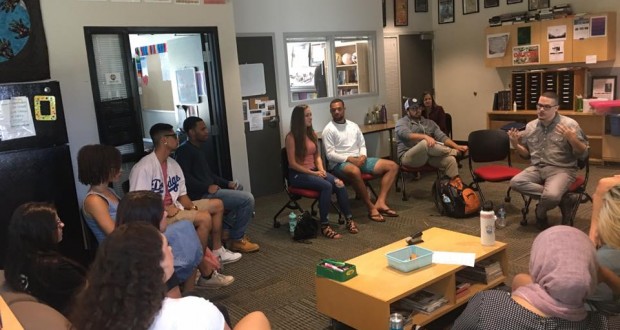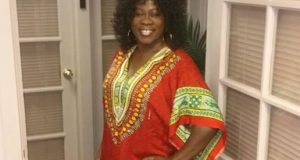By Angela M. Coggs
On Wednesday, September 27, long before Shaun King arrived on the well-lit stage of Memorial Chapel on the University of Redlands campus, there were continuous rumblings, inside and outside, of a very diverse group of people heading into the large, soon to be, packed room. King, journalist, humanitarian, activist and the Senior Justice Writer for the New York Daily News, is amongst the most compelling voices: a humane and passionate advocate for justice and families, and an extremely visible fundraiser for victims of brutality and discrimination. His topic of choice was “The New Civil Rights.”
It is difficult to ignore that there are crucial conversations undulating across North America—conversations happening on social media, on campuses, in the streets and around dinner tables. In greater numbers, people are talking about real empowerment and liberation for historically disadvantaged groups. When it comes to the Black Lives Matter movement, they’re talking specifically about human dignity for African Americans.
“Shaun King visiting Southern California was truly a breath of fresh air. Hearing him speak was not only a modern-day history lesson, but also a call to action that every one of us could participate in. It does not have to be grand in scale to be effective, nor does it require an army of people,” explained Barbara Franklin, graduate student at A.T. Still University. “It simply takes everyday people, like you and me, who are sensitive to the critical condition our country is currently in and are committed to finding small, simple ways to make sure our tomorrow is better than today.”
Absent was the large group of protesters that many of the attendees expected. Conservations of tickets holders outside the venue echoed their surprise of how calm the evening was. Some mentioned expecting to see a group of Trump supporters to make an appearance and cause a disturbance. Although many closely observed the lone attendee proudly wearing a “Make America Great Again” hat. HE entered the chapel and sat in the middle of the room, as if he, silently, wanted to make sure King was aware of his presence.
King is known for his use of social media as a platform to highlight and amplify cases of police brutality, racial discrimination, sparking discussions on civil rights and shaping the way people understand racial injustice today. He recounted an email he received from an old college friend in July 2014 that ignited his life in the direction of work as a social influencer. The email contained a link to what would become the viral video known as the unjust and unwarranted death of an unarmed black man, Eric Garner. King explained that watching the disturbing footage of the police brutality on Garner led to his passion for the issue, “that latched itself on, till [the point] where I couldn’t let go,” A few weeks later, he received another email that set a fire in his spirit. The email contained a livestream video footage of the brutal shooting of Michael Brown. He knew our country was hurting and that we were in trouble.
“It is hard to understand where we are in the scheme of history,” King explained. “[But] all of you have a gut feeling that something is wrong in our country.”
As he spoke and the evening progressed, it was clear that he was making a positive impact and his message resonated among the crowd.
“Imagine someone just killed the person who matters most to you,” described King. “The pain I saw in the streets was [that] tangible.”
Before long, King began to realize that these killings are not happening as infrequently as reported by the news outlets. He was shocked to discover that unarmed black men, women and children weren’t just killed by the police a few times a year, but not so uncommonly now, upwards to ten times a day. By sharing videos that demonstrated clear cases of police brutality on his social media, King thought, alike many concerned, like minded Americans, someone would be held responsible. But by December of 2014, he realized that “there would be no justice, no matter how many protests or retweets.” The current state of the country was fogging and unclear and during that moment of his life, King described himself as in a “funk.” He admitted that he never have worked so hard in his life without any reward.
After explaining how his spirit of activism was born, King enlightened the audience on Leopold von Ranke, well known as the father of history. After taking a history class, that he unsuccessfully tried to drop, King thought “what am I going to learn from this guy?” King admitted that, surprisingly, he learned a very in important lesson that cultivated his understanding of the growth of humanity. According to Ranke, he found that, after mapping human beings throughout history, that we do not get better and better over time– technology certainly does, but humanity does not. Instead, throughout history, humanity has moments where we peak and moments where we dip.
The lesson King learned from Ranke sparked a study of his own. During the Charlottesville white supremacy demonstrations, King used twitter as a way to research sociological trends. “Twitter is an amazing tool,” King continued. “Because you can see millions of thoughts at particular moments of history.”
According to King, there was a recurring question among twitter users: “How can we be going back in time?” King explains that this comes from the notion that human beings are consistently getting better. Pointing to the climax of an exponential bar graph, King joked, “that would make Donald Trump peak humanity.” The laughter from the audience was an indication that they certainly did not agree with that statement.
By referencing historical tragedies such as the Transatlantic Slave Trade, the Holocaust or Rwanda genocide, King illustrated that humanity does not just ripen with age. “If we are getting better and better, how do we explain that?” King asked.
“Last year 121 unarmed black men, women and children were killed by American policemen,” shares King. “We would have to go back to 1902 to find that many black people lynched in a year.” King goes on to define “unarmed” by sharing with the audience that he had to remove an instance of police brutality from an article where a black man was killed carrying just a spoon, because that was considered to be a weapon, emphasizing the idea that these deaths aren’t justified by a self-defense claim.
“Somehow we like to look back at injustice and say it is wrong,” shares King. “But struggle to find injustice in front of us.” King further explains that if we do not understand what phase humanity is in, society cannot advance.
“It is easy as hell to find yourself in a dip, but hard as hell to get out of it,” shared King. With that being said, King described to the audience how to predict when a dip will occur and how humanity can get out of the dip.
The dip ensues when the status quo is challenged, confronted. King further particularizes that whenever there is an innovation that disturbs or threatens those in power, humanity plummets. The most modern innovation was the election of America’s first black President, Barack Obama. King explained that this innovation resulted in a steady increase of hate crimes during the Obama administration, and ultimately the election of Donald Trump.
It is going take four things for humanity to get out of this dip. “First, it’s going take an enormous amount of energy and second, it’s going to take people,” reveals King. “Third, it’s going take organization, something we are struggling with, and fourth, it’s going take hope.”
Often people wonder what role they would play in the Civil Rights Movement, but King reveals that we “don’t have to wonder who [we] would have been in a previous time, because we are in a time that requires just as much energy, people, organization, hope, and now.” With that thought in mind, the entire audience rose in applause.
“The connections Mr. King’s visit facilitates among like-minded locals are invaluable. Filling a large chapel with local Black Lives Matter supporter’s shows everyone—allies and detractors—that we’re here, and that we’re actively promoting inclusion and justice,” explained Marianne Farretta, a local Redlands professional.
Farretta further noted, “I found Mr. King’s observation that our humanity is not continuously improving, but rather dips and peaks, both intimidating and encouraging; we’re not crazy—things really are this bad. But true American values—not Make America Great Again values—true American values of free speech and worth inherent to all skin colors, all cultures, and all classes—have carried us through low times before.”
Overall, this is the message America needs right now. In the last couple of months, I have been encouraged by high visibility, high privilege leaders using their status to denigrate intolerance. And while that outpouring does not heal the divide, and does not stop the police killings of unarmed black men, and does not balance out other transgressions; it offers hope that the scales will tip and we will emerge again from what Mr. King calls “The Dip.”
At one point in the evening King asserted that we needed to stay “woke.” He stopped and turned his attention to the interpreter who was seated at the far right side of the stage. King then stated, “I’m curious. What did you sign for “woke?” The interpreter repeats the gesture and King smiled and replied, “That’s cool, I like that.” Both the audience erupted with laughter.
Shaun King visiting Southern California was truly a breath of fresh air. Hearing him speak was not only a modern-day history lesson, but also a call to action that each and every one of us have the opportunity to participate in. It does not have to be grand in scale to be effective, nor does it require an army of people,” explained Barbara Franklin, graduate student at A.T. Still University. “It simply takes everyday people, like you and me, who are sensitive to the critical condition our country is currently in and are committed to finding small, simple ways to make sure our tomorrow is better than today.”
By the end of the evening, that lone, self-identified Trump supporter that entered the Chapel wearing the distinct red baseball Make America Great Again now blended in with the otherwise diverse, yet likeminded group of social justice activists. Apparently, he had decided to take off his hat at some point during the evening. This writer wanted to inquire about what exactly made him remove his hat but he amalgamated into the sea of individuals. Maybe that night was the first time that he actually sat down and took note to the real issues at hand.
 Westside Story Newspaper – Online The News of The Empire – Sharing the Quest for Excellence
Westside Story Newspaper – Online The News of The Empire – Sharing the Quest for Excellence




